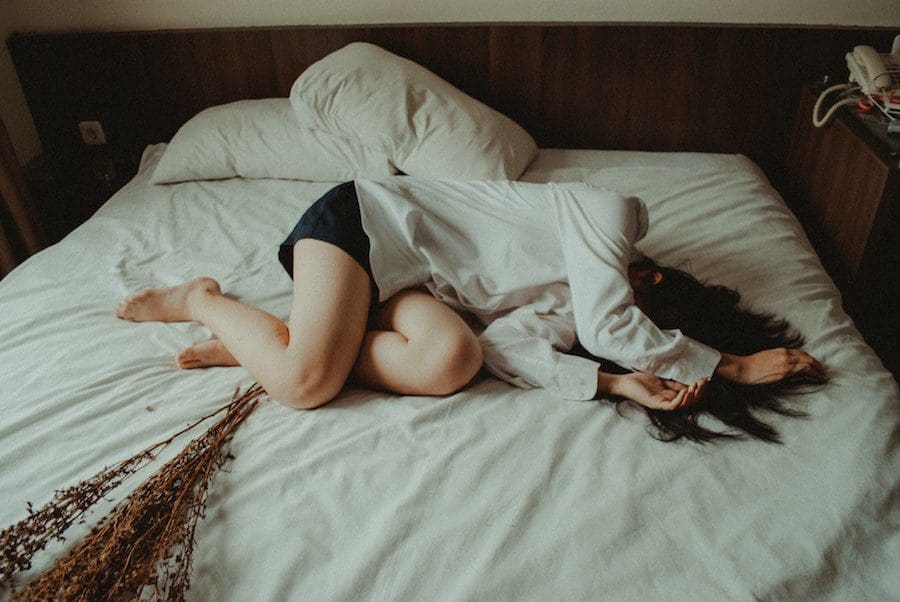Full Disclosure: Clicking on these links could mean a tiny commission for me, at no extra cost to you.
Anxiety is a normal emotion that everyone experiences from time to time. It can be caused by stressors, such as work or family problems. Anxiety can also be caused by physical factors, such as caffeine or medical conditions. While anxiety is a normal emotion, it can become a problem if it interferes with your daily life. With weighted blankets, deep breathing exercises, and other relaxation techniques, you can reduce your anxiety at night and get the rest you need.
Reduce Anxiety At Night
If you’re one of the millions of Americans who suffer from anxiety, you know that it can be a burden that extends far beyond the daytime hours. Many people with anxiety find their symptoms worse at night, making it difficult to fall asleep and stay asleep. Fortunately, there are several things you can do to ease your anxiety and get a better night’s sleep. Try these ten tips for easing anxiety at night!
1. Stick To A Routine
Go to bed and wake up at the same time each day, even on weekends. This will help regulate your body’s natural sleep-wake cycle.
2. Avoid Caffeine And Alcohol Before Bed
Most people are aware of the fact that caffeine and alcohol can have adverse effects on their sleep. However, many people still drink coffee or have a few drinks before bed. While it may seem like an excellent way to wind down at the end of the day, caffeine and alcohol can seriously affect your sleep quality.
Caffeine is a stimulant, which means that it can make it difficult to fall asleep. It can also cause you to wake up more during the night. Alcohol, on the other hand, is a depressant. While it may help you fall asleep initially, it reduces the quality of your sleep and can cause you to wake up feeling groggy and exhausted. If you’re looking for ways to improve your sleep, avoiding caffeine and alcohol before bed is an excellent place to start.
.
3. Consider Mushroom Extracts for Stress Relief
If you’re searching for ways to reduce anxiety at night, there are various strategies you can try to promote a better night’s sleep. Consider incorporating supplements such as lion’s mane extract for stress relief. Lion’s mane is a medicinal mushroom with potential cognitive and mood benefits, including reducing anxiety. Lion’s mane extract capsules are available for purchase through various online retailers and health food stores. When incorporating lion’s mane extract capsules into your routine, it’s important to follow the recommended dosage instructions provided by the manufacturer. You may find an additional tool to help manage your anxiety and improve your quality of sleep by exploring natural supplements like lion’s mane extract capsules.
4. Create A Relaxing Bedtime Ritual
Take a warm bath, read a book, or do some gentle stretching before bed. This will help signal to your body that it’s time to wind down for the evening.
5. Make Sure Your Bedroom Is Dark, Quiet, And Comfortable
A dark room helps promote melatonin production, which is crucial for sleep. If outside noise keeps you up, try using a white noise machine or earplugs to block it. And make sure your bed is comfortable so you can rest well through the night.
6. Establish A Regular Exercise Routine
Exercise has numerous benefits for mental health, including reducing anxiety levels. Just be sure not to exercise too close to bedtime, as this can have the opposite effect and make it harder to fall asleep.
7. Practice Relaxation Techniques Such As Deep Breathing Or Progressive Muscle Relaxation
Relaxation techniques can provide some benefits for both your mind and body. Deep breathing helps to promote relaxation by slowing the heart rate and decreasing blood pressure. It also helps improve the immune system’s function and reduce stress hormones.
Progressive muscle relaxation involves tensing and relaxing specific muscle groups throughout the body, helping to alleviate tension and improve circulation. Practicing deep breathing or progressive muscle relaxation regularly can help reduce stress levels, improve sleep, and boost your overall health.
8. Avoid Working Or Using Electronic Devices In Bed
The blue light emitted by screens can disrupt your body’s natural sleep-wake cycle and make it harder to fall asleep. Reserve the bedroom for nighttime activities only so that your brain associates it with relaxation and not with stressors like work or school obligations.
9. Limit Your Exposure To Stressful News And Events Before Bedtime
Anxious thoughts can keep you up at night, so try not to watch the news or engage in heated political debates right before going to bed. Instead, focus on positive thoughts and things that make you happy before bed.
10. Write Down Your Worries In A Journal
Getting your anxious thoughts out of your head can help them feel less overwhelming. Plus, you can develop a plan to address them the following day.
11. Seek Professional Help If Your Anxiety Is Severe Or Interfering With Daily Life
If self-help strategies aren’t enough, consider meeting with a therapist specializing in anxiety disorders. Cognitive behavioral therapy (CBT) is an effective treatment for many people with anxiety.
Anxiety is a common problem that can make it challenging to get a good night’s sleep. Fortunately, there are things you can do to reduce your anxiety at night so you can get the rest you need. Try these ten tips and see what works for you. If your anxiety is severe or interferes with daily life, seek professional help from a therapist specializing in anxiety disorders.











